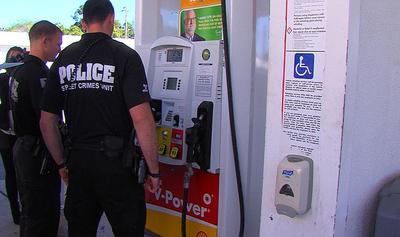Texas C-Stores Fight Skimming
The new c-store industry-specific effort offers tips to avoid skimming and cautions against using Bluetooth as a skimming detection tool.
AUSTIN January 11, 2018; NACS Online reported that consumers in Texas and across the United States need to be vigilant about new threats to their data from card skimmers. This week, the Texas Food and Fuel Association (TFFA) launched new campaign to share tips for keeping card data safe at the pump. The effort includes three public service announcements (PSAs) featuring Houston Police Chief Art Acevedo, a social media campaign and a website.
<
“Skimming is an unfortunate part of today’s technology-driven society,” Acevedo says in the video PSAs. “If you’re concerned about a gas pump’s security, or think you’ve detected a skimmer, report it to the store management immediately. Convenience stores, law enforcement, and consumers in Texas all play a crucial role in preventing skimming at the pump.”
“Fortunately, incidents of credit card skimming make up a very small fraction of the over-all fill ups across our state but our industry is committed to arming consumers with the information they need to protect their credit card data,” said Paul Hardin, TFFA president. “Chief Acevedo is a recognized and well-respected leader in law enforcement. We appreciate his commitment to this issue and his partnership with us in our consumer awareness campaign.”
According to the TFFA, here are key tips for consumers to stay safe at the pump:
- Physical examination: when at the pump, check the dispenser door for signs of forced entry. A good indicator of a problem is a door that does not align properly or has unusual scraping or wear around the edges.
- If the gas pump has security labels, check to see if they have been broken.
- Pull on the card reader and run your fingernail around the edge of the keypad to make sure they are firm and secure; thieves often install overlays that are loose and have a tendency to wiggle.
- If using a debit card at the pump, run it as a credit card instead of entering a PIN. If that’s not an option, shield the keypad when entering a PIN.
- As always, it’s a good idea to monitor credit card and bank accounts regularly to spot unauthorized charges.
The Texas convenience store industry also is working to combat misinformation such as reports encouraging customers to use their Bluetooth to detect skimmers at the pump. Hardin said this method is unreliable for key reasons:
- A
cell phone Bluetooth range can pick up signals from nearby vehicles or
bystanders up to 30 feet away.
- Bluetooth naming is not regulated: While a random string of numbers and letters on a device list might appear suspicious, that does not mean the signal is being emitted from a skimmer on the pump.
“Using a smartphone’s Bluetooth isn’t an accurate or reliable way to detect the presence of a skimmer,” Hardin said. “And doing so may lead to a false positive reading that can cause a pump to be shut down—often for several weeks—which can negatively impact a convenience store, the owners, employees, and customers.”
Collectively, TFFA members own, operate and supply more than 12,000 retail, commercial and agriculture fueling sites across Texas; distribute approximately 9 billion gallons of gasoline and diesel fuel each year; and supply fuels to end users including motorists, aviation, marine, manufacturing, government, agriculture and construction. “The convenience retailing industry is working to combat this issue through employee education, software upgrades, and modernized equipment,” Hardin said.
More information from TFFA on card skimmers is available at skimmingprevention.org.
Skimming resources for the convenience and fuel retailing industry can also be found at convenience.org/skimming.



